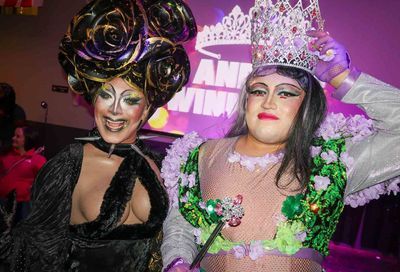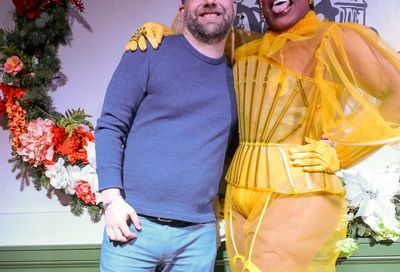D.C. Jury Awards $930K to Trans McDonald’s Employee for Bias
The verdict is believed to be the first in favor of a plaintiff suing for gender identity discrimination under D.C.'s Human Rights Act.

“I feel extremely grateful for the result of the court case. I feel blessed,” says Diana Portillo, a transgender immigrant who recently won a historic judgment relating to a discrimination and harassment lawsuit against the owner of the McDonald’s franchise for which she worked. “I always had faith in God that it was going to turn out right.”
In August, Portillo was awarded $930,000 by a D.C. Superior Court jury for the discrimination she experienced due to her gender identity, as well as retaliation for complaining while employed in 2013 at a McDonald’s on Georgia Ave. in Northwest D.C.
The financial award includes $700,000 in punitive damages, and $230,000 for emotional distress, pain, and suffering.
The jury’s verdict is believed to be the first-ever handed down in favor of a transgender employee who sued for discrimination based on gender identity under the DC Human Rights Act.
“Diana exhibited enormous courage and conviction from the time she first asked to have her gender identity respected throughout her employment,” says Jonathan Puth, one of her lawyers from Correia & Puth, PLLC, a D.C.-based law firm specializing in employment disputes.
“After she was fired, she knew her rights and stood up for them. The jury’s verdict was a resounding victory — and an important victory for her and for the entire community.”
Portillo was also represented by Correia & Puth attorney Andrew Adelman, and previously by the legal team at Whitman-Walker Legal Clinic.
The on-the-job abuse began over 11 years ago when Portillo underwent a gender transition and began presenting according to her gender identity at work.
She approached her boss, the general manager at the McDonald’s restaurant, owned by International Golden Foods, LLC (IGF), to ask that she be referred to by her preferred name and pronouns, and to ask other employees to address her as such.
Despite D.C. law prohibiting discrimination on the basis of gender identity, the manager failed to comply with her request, and other managers and staffers continued to “deadname” and misgender her, without being corrected.
“They really didn’t want to accept what I was asking them,” Portillo tells Metro Weekly. “In the beginning, they teased me a lot. There were only 2 or 3 people who ever tried to call me by pronouns. The rest of them did not.”
The harassment made not only Portillo uncomfortable, but other workers as well, due to the toxic nature of the work environment and the ongoing harassment.
“I had to ask them over and over for them to give me the respect I deserve,” Portillo says. “And I always reminded them, but it really made everybody at work uncomfortable.”
Portillo submitted a discrimination complaint to her superiors within the company, but IGF took no action. Portillo took her complaint to a higher authority the following year, approaching the director of operations for several franchises owned by IGF, but still, no actions were taken to remedy the harassment.
Portillo continued to be misgendered — oftentimes, deliberately — at work. Co-workers and even some superiors would make fun of Portillo for wearing makeup, calling her a “clown.”
People would refer to her male body parts, making crude remarks and using anti-gay slurs while ridiculing her for being transgender.
Once it became known that Portillo had complained of the discrimination, the mistreatment worsened.
In 2016, a supervisor confronted Portillo for using the women’s restroom, calling her out in front of other workers. “You’re not a woman, you’re a man,” the supervisor asserted.
Portillo complained of discrimination again, and was fired eight days later. She would later file an administrative charge with the D.C. Office of Human Rights alleging that the harassment and discrimination she suffered, including retaliation against her for filing her initial complaint, violated her rights under the D.C. Human Rights Act.
Portillo’s lawyers at Whitman-Walker Legal Clinic attempted to resolve the case with IGF, but were unable to reach a settlement. They referred Portillo’s case to Correia & Puth, which filed the discrimination lawsuit in court in 2021.
After an eight-day trial this summer, the jury sided with Portillo, finding that she was entitled to damages.
The $930,000 monetary judgment is separate from any attorneys’ fees Portillo incurred in the course of bringing the lawsuit, which, under the Human Rights Act, IGF is required to pay.
Puth hopes the verdict will send a message to IGF and other employers throughout the District that they need to comply with the law, and may face severe penalties if they allow discrimination or harassment of transgender and gender-nonconforming individuals to continue unabated.
Portillo has since taken a job as a community health worker working on HIV and STD prevention with La Clínica del Pueblo. She is also working with youth groups in D.C. and Hyattsville, saying she likes to give back to the LGBTQ community that was supportive of her during her ordeal.
“I am giving a little back of what I gained from the community,” she says, “because this organization really helped me when I needed it.”
Portillo recently received more good news — her application for asylum was granted, giving her a chance to obtain permanent resident status in the U.S. She will be applying for a green card in October.
Portillo hopes her story can be held up as an example for other people facing similar hostile work environments.
“I would tell people to persevere, to not give up,” she says. “To believe in their story and to believe in themselves, and to have a team that supports them. I’ve always believed in myself, and I would tell them not to put up with situations in which they’re being attacked, humiliated, and [subjected to] abusive work environments that I know still exist today.”
Support Metro Weekly’s Journalism
These are challenging times for news organizations. And yet it’s crucial we stay active and provide vital resources and information to both our local readers and the world. So won’t you please take a moment and consider supporting Metro Weekly with a membership? For as little as $5 a month, you can help ensure Metro Weekly magazine and MetroWeekly.com remain free, viable resources as we provide the best, most diverse, culturally-resonant LGBTQ coverage in both the D.C. region and around the world. Memberships come with exclusive perks and discounts, your own personal digital delivery of each week’s magazine (and an archive), access to our Member's Lounge when it launches this fall, and exclusive members-only items like Metro Weekly Membership Mugs and Tote Bags! Check out all our membership levels here and please join us today!
























You must be logged in to post a comment.